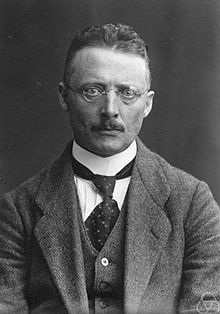Loading AI tools
Austrian mathematician (1875–1954) From Wikipedia, the free encyclopedia
Ernst Sigismund Fischer (12 July 1875 – 14 November 1954) was a mathematician born in Vienna, Austria. He worked alongside both Mertens and Minkowski at the Universities of Vienna and Zurich, respectively. He later became professor at the University of Erlangen, where he worked with Emmy Noether.
You can help expand this article with text translated from the corresponding article in German. (February 2010) Click [show] for important translation instructions.
|
Ernst S. Fischer | |
|---|---|
 ca. 1920 | |
| Born | 12 July 1875 |
| Died | 14 November 1954 (aged 79) |
| Nationality | Austrian |
| Alma mater | University of Vienna |
| Known for | Riesz–Fischer theorem Fischer's inequality |
| Spouse | Ellis Strauss |
| Children | Ursula |
| Scientific career | |
| Fields | Mathematics |
| Institutions | University of Cologne |
| Thesis | Zur Theorie der Determinanten (1899) |
| Doctoral advisor | Franz Mertens Leopold Gegenbauer |
His main area of research was mathematical analysis, specifically orthonormal sequences of functions, which laid groundwork for the emergence of the concept of a Hilbert space.
The Riesz–Fischer theorem in Lebesgue integration is named in his honour.
He is the grandson of composer Karl Graedener.[1][2]
Seamless Wikipedia browsing. On steroids.
Every time you click a link to Wikipedia, Wiktionary or Wikiquote in your browser's search results, it will show the modern Wikiwand interface.
Wikiwand extension is a five stars, simple, with minimum permission required to keep your browsing private, safe and transparent.